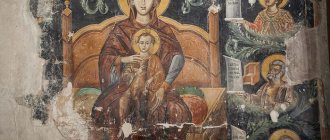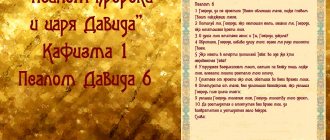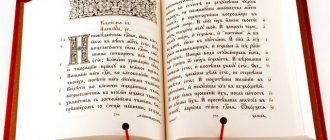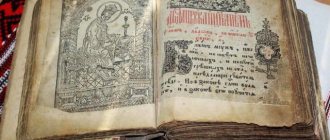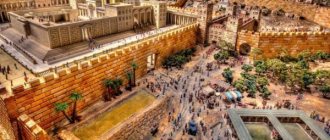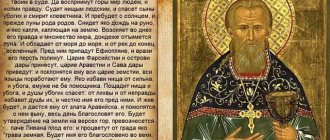Psalm 68 read:
1 Finally, about those who have changed, a psalm to David
2 Save me, O God, for you brought water down to my soul. 3 The coal-burner is in depth, and there is no permanence. I came to the depths of the sea, and the storm drowned me. 4 My cry has become weary, my throat has become silent, my eyes have disappeared from my hope in my God. 5 They that hate me have multiplied more than the hair of my head; they have become stronger in my enemies, those who cast me out unjustly: although I did not delight, then I was rewarded. 6 O God, You have taken away my foolishness, and my sins have not been hidden from You. 7 Let not those who suffer You, O Lord, Lord of hosts, be ashamed for me; let those who seek You, O God of Israel, be ashamed for me. 8 Because for Your sake I have endured reproach; You have covered my face with shame. 9 I was a stranger to my brethren, and strange to my son’s mother. 10 For zeal for Your house has consumed me, and the reproaches of those who reproach You have attacked me. 11 And I covered my soul with fasting, and it became a reproach to me, 12 and I put my garment on sackcloth, and became a parable to them. 13 Those who sit in the gates mock me, and those who drink wine mock me. 14 But my prayer is to You, O God, time of favor, O God, in the abundance of Your mercy, hear me, in the truth of Your salvation. 15 Save me from the clay, that I may not sink, that I may be delivered from those who hate me, and from the deep waters. 16 Let not a storm of water drown me, let the depth below devour me, let a peer speak of me with his mouth. 17 Hear me, O Lord, for Thy mercy is good; according to the multitude of Thy compassions look upon me. 18 Do not turn Your face away from Your servant, for I am in sorrow; hear me quickly. 19 Take my soul, and deliver me, my enemy, for the sake of deliver me. 20 For thou weighest my reproach, and my sorrow, and my shame: before thee are all those who insult me. 21 My soul has longed for reproach, and I have longed and waited for the afflicted, and have not received, and have not found comforters, and have not found. 22 And you gave me gall for my food, and gave me drink for my thirst. 23 Let their table be a snare before them, and a reward, and a temptation. 24 Let their eyes be darkened, so that they cannot see, and let their backs be cut off. 25 Pour out Thy wrath upon me, and let the fury of Thy wrath come upon them. 26 Let their court be desolate, and let there be no living thing in their dwellings. 27 Thou hast smote him, and thou hast driven thee away, and thou hast added to my disease my wounds. 28 Add iniquity to their iniquity, and let them not enter into Your righteousness. 29 Let them be consumed of the book of the living, and let them not be written with the righteous. 30 I am poor and sick: let Thy salvation, O God, receive me. 31 I will praise the name of my God with a song, I will magnify Him in praise: 32 And God will be more pleasing than a young calf, wearing horns and claws. 33 Let the poor see and be glad: seek God, and your soul will live. 34 For when the poor Lord hears, He does not despise His own chains. 35 Let the heavens and the earth, the sea and all that live in it, praise Him. 36 For God will save Zion, and the cities of Judah will be built, and they will inhabit it, and they will inherit it, 37 and the seed of Your servants will remain there, and those who love Your name will dwell in it.
A Psalm of David interspersed with prophetic words about Christ: 68:1-4 To the head of the choir. On Shoshannim. Psalm of David. 2 Save me, O God, for the waters have reached [my soul]. 3 I am mired in a deep swamp, and there is nothing to stand on; I entered the depths of the waters, and their rapid current carries me away. 4 I am exhausted from crying, my throat is dry, my eyes are weary from waiting for [my] God.David’s feelings in one of the periods of his life: sometimes life leads into such dead ends from which there is no way out, that not even a step in action means failure and the result is even worse than if you are inactive, a little more and it seems that you will drown in your own waves of action. No matter how you scream, even howl, the problem is not solved, and God, it seems, does not even plan to listen to the cries of the caller. At such moments, there is nothing left to do but submit to the problem that has arisen and simply endure its presence.
68:5 Those who hate me without guilt are more than the hairs of my head; my enemies, who persecute me unjustly, have become stronger; what I did not take away, I must give.
David’s problem was the presence of enemies who wanted him to die and David’s ignorance of what to do in this situation: he was not guilty of anything before them, but this did not change their desire to destroy David. However, these words and experiences are characteristic of Christ: what he did not take away - life from people - he must give.
68:6,7 God! You know my madness, and my sins are not hidden from You. 7 Let not all who trust in you, O Lord God of hosts, be put to shame in me. Let not those who seek You, O God of Israel, be put to shame in me,
David is calm about the fact that God knows everything about him: both his folly and his sins. However, he is worried that those who hope in him and that God will help him as God’s servant do not break in their faith on him if David fails to live up to their expectations. David does not want anyone to stumble and walk away from God.
68:8-10 For for Your sake I bear reproach, and my face is covered with dishonor. 9 I have become a stranger to my brothers and a stranger to my mother’s sons, 10 for zeal for Your house consumes me, and the slander of those who slander You falls on me;
These words apply to Christ: for his family and friends, Christ became a stranger, he is considered a madman, for because of zeal for his Father’s House, Jesus behaved defiantly, as it might seem to outsiders, when he overturned the tables of the money changers and destroyed the shopping arcades in the temple. And for the sake of fulfilling the work of God, he had to endure such an attitude towards himself to the end and could not say anything more about himself in his justification before outsiders than he said.
68:11-13 and I weep, fasting with my soul, and this is reproached to me; 12 And I put on sackcloth instead of clothing, and I become a byword to them; 13 Those who sit at the gate talk about me, and those who drink wine sing in songs.
Further, David speaks about himself and prophetically about Christ: that even the sorrows and torments of David/Christ were mercilessly blamed on him, without the slightest compassion for him in his experiences.
He became the talk of the town - every passerby made fun of him, even drunkards - and they gossiped about him. But he was a king by God’s election. 68:14,15 And I come to You with my prayer, O Lord;
in an acceptable time, O God, according to Your great goodness, hear me in the truth of Your salvation; 15 Bring me out of the mire, so that I do not sink; May I be delivered from those who hate me and from deep waters; But David patiently endured all this mockery and ridicule directed at himself, and at the same time, he did not cease to cry out to the Lord and ask Him for help.
It is interesting that David speaks about a time favorable for his prayer to be heard: not every time, it turns out, is favorable for Jehovah in the sense that God Himself knows what and when He should hear and how to respond to what He hears. David asks to be taken out of the mud, which is sucking him deeper and deeper into problems, otherwise he will become completely weak in resisting troubles. 68:16-19 Let not the rush of the waters carry me away, let not the deep swallow me up, and let not the abyss of its mouth close over me.
17 Hear me, O Lord, for Thy mercy is good; according to the multitude of Your compassions, look upon me; 18 Hide not Thy face from Thy servant, for I am grieved; hear me soon; 19 draw near to my soul, deliver it; for the sake of my enemies save me. David does not want to drown in the abyss of troubles, and therefore asks God to help him get out and at least have some relief.
68:20-22 Thou knowest my reproach, my shame, and my disgrace: my enemies are all before thee.
21 Reproach crushed my heart, and I grew weak; I waited for compassion, but there was none; comforters, but I found none. 22 And they gave me gall for food, and in my thirst they gave me vinegar to drink. These words refer to Christ and one can imagine how much Jesus suffered internally from experiences, for he was a man: reproach crushed his heart, for he came to glorify God, and he was exposed as a Blasphemer. Such torment and such injustice were not easy to endure, although he knew that it had to be so. The fact that finally and in addition to all the mockery of him - they gave him bile and gave him vinegar to drink - was also predicted by David.
68:23-26 Let their table be a snare to them, and their peaceful feast a snare; 24 Let their eyes be darkened, so that they cannot see, and let their loins relax forever; 25 Pour out Your wrath on them, and let the fire of Your wrath consume them; 26 Let their habitation be desolate, and let no one dwell in their tents,
These curses are about darkening the eyes of the enemies of Christ, so that their dwelling is empty and the wrath of the Lord is poured out on them - not Christ’s, for he asked God not to count their crime against them. David, apparently, asks for such retribution for his enemies.
68:27 for those whom You have struck, they [still] pursue, and the sufferings of those wounded by You multiply.
Why is David so angry with his enemies? Because it’s not enough for him that he himself - God punished him in every possible way, so punished by God - is also being persecuted by these people, finishing off almost dead.
68:28,29 Add iniquity to their iniquity, and let them not enter into Thy righteousness; 29 Let them be blotted out from the book of the living, and not be written with the righteous.
This kind of criminals who do not spare the “wounded” will not be recorded in God’s book of life; only the righteous can be included there.
68:30-32 But I am poor and suffering; May Your help, O God, restore me. 31 I will praise the name of [my] God in song, I will exalt Him in praise, 32 and this will be more pleasing to the Lord than an ox, than a calf with horns and hoofs.
But David is not one of those who finish, but one of those who suffer, and therefore his hope in God does not dry up. And he plans to praise God with his lips, which will be much better than all the sacrifices with horns and hooves.
68:33,34 Those who suffer will see [this] and rejoice. And your hearts, those who seek God, will quicken, 34 for the Lord listens to the poor and does not despise His prisoners.
And the fact that God will help David will encourage all those who suffer: from his example, they will be able to see for themselves hope for help from God.
68:35-37 Let the heavens and the earth, the seas and everything that moves in them, praise Him; 36 For God will save Zion and build the cities of Judah, and they will dwell there and inherit it, 37 and the descendants of His servants will be established in it, and those who love His name will dwell in it.
David is confident that in the end, the people of God will not disappear from the face of the earth completely, God is able to restore them from any suffering and problems, and the capital of the state of God and the state itself - that is, ALL the people of God on earth (not literal Judea, but spiritual) - will be prosper.
Psalm 68 in Russian:
1 To the director of the choir. On Shoshannim. Psalm of David.
2 Save me, O God, for the waters have reached [my soul].
3 I am mired in a deep swamp, and there is nothing to stand on; I entered the depths of the waters, and their rapid current carries me away.
4 I am exhausted from crying, my throat is dry, my eyes are weary from waiting for [my] God.
5 Those who hate me without cause are more than the hairs of my head; my enemies, who persecute me unjustly, have become stronger; what I did not take away, I must give.
6 God! You know my madness, and my sins are not hidden from You.
7 Let not all who trust in you, O Lord God of hosts, be put to shame in me. Let not those who seek You, O God of Israel, be put to shame in me,
8 For for Your sake I bear reproach, and my face is covered with dishonor.
9 I have become a stranger to my brothers and a stranger to my mother’s sons,
10 For zeal for Your house consumes me, and the slander of those who slander You falls upon me;
11 And I weep, fasting with my soul, and this is reproached to me;
12 And I put on sackcloth instead of clothing, and I become a byword to them;
13 Those who sit at the gate talk about me, and those who drink wine sing in songs.
14 And I come to You with my prayer, O Lord; in an acceptable time, O God, according to Your great goodness, hear me in the truth of Your salvation;
15 Bring me out of the mire, so that I do not sink; May I be delivered from those who hate me and from deep waters;
16 Let not the rush of the waters carry me away, let not the deep swallow me up, let not the abyss of its mouth close over me.
17 Hear me, O Lord, for Thy mercy is good; according to the multitude of Your compassions, look upon me;
18 Hide not Thy face from Thy servant, for I am grieved; hear me soon;
19 draw near to my soul, deliver it; for the sake of my enemies save me.
20 Thou knowest my reproach, my shame, and my disgrace: my enemies are all before thee.
21 Reproach crushed my heart, and I grew weak; I waited for compassion, but there was none; comforters, but I found none.
22 And they gave me gall for food, and in my thirst they gave me vinegar to drink.
23 Let their table be a snare to them, and their peaceful feast a snare;
24 Let their eyes be darkened, so that they cannot see, and let their loins relax forever;
25 Pour out Your wrath on them, and let the fire of Your wrath consume them;
26 Let their habitation be desolate, and let no one dwell in their tents,
27 For those whom You have struck, they still pursue, and the sufferings of those wounded by You increase.
28 Add iniquity to their iniquity, and let them not enter into Thy righteousness;
29 Let them be blotted out from the book of the living, and not be written with the righteous.
30 But I am poor and suffering; May Your help, O God, restore me.
31 I will praise the name of [my] God with song, I will extol Him with praise,
32 And this will be more acceptable to the Lord than an ox, than a calf with horns and hoofs.
33 Those who suffer will see this and rejoice. And your heart will revive, you who seek God,
34 For the Lord listens to the poor and does not despise His prisoners.
35 Let the heavens and the earth, the seas and everything that moves in them, praise Him;
36 For God will save Zion and build the cities of Judah, and they will dwell there and inherit it,
37 And the descendants of His servants will be established in it, and those who love His name will dwell in it.
What is the help from reading the Orthodox text Psalm 68
no comments
The text of Orthodox Psalm 68 was written by the prophet David and reflects his thoughts and feelings during the persecution of Saul. It should be noted that the psalm was written not during the persecution of the psalmist, but at the end of his life, when the heart of King David sank from the memories of what he had experienced.
Thanks to the interpretation of Psalm 68, it becomes clear that in it the king expresses his loneliness. Thus, the phrase “I became a stranger to my brothers and a stranger to my mother’s sons” suggests that even the closest people were afraid to contact King David, so as not to fall out of favor with the suspicious Saul.
Help from Psalm 68: in what cases is the Song of David read?
Christian Psalm 68 is considered one of the clearest examples of prophetic song. His verse “And they gave me gall for food, and in my thirst they gave me vinegar to drink” (Ps. 68:22) is often cited as evidence of the divine origin of Jesus Christ, because it literally describes the suffering of the Savior on the cross, when He, suffering from thirst, , instead of water they brought a sponge soaked in vinegar. Listening online and reading Psalm 68 is recommended during severe floods, accompanied by loss of life and destruction.
Listen to the video of the Orthodox prayer Psalm 68 in Russian
Read the text of the prayer Psalm 68 in Russian
To the head of the choir. On Shoshannim. Psalm of David.
Save me, O God, for the waters have reached my soul. I am mired in a deep swamp, and there is nothing to stand on; I entered the depths of the waters, and their rapid current carries me away. I am exhausted from crying, my throat is dry, my eyes are tired from waiting for my God. Those who hate me without guilt are more than the hairs of my head; my enemies, who persecute me unjustly, have become stronger; what I did not take away, I must give. God! You know my madness, and my sins are not hidden from You. Let not all who trust in You be ashamed in me, O Lord, God of hosts. Let not those who seek You, O God of Israel, be put to shame in me, for for Your sake I bear reproach, and they cover my face with dishonor. I have become a stranger to my brothers and a stranger to my mother’s sons, for zeal for Your house consumes me, and the slander of those who slander You falls on me; and I weep, fasting with my soul, and this is reproached to me; and I put on sackcloth instead of clothing, and I become a byword to them; Those who sit at the gate talk about me, and those who drink wine sing in songs. And I with my prayer to You, Lord; in an acceptable time, O God, according to Your great goodness, hear me in the truth of Your salvation; take me out of the mire, so that I do not sink; May I be delivered from those who hate me and from deep waters; Let the rush of the waters not carry me away, let the abyss not swallow me up, and let the abyss not close its mouth over me. Hear me, O Lord, for Thy mercy is good; according to the multitude of Your compassions, look upon me; Hide not Thy face from Thy servant, for I am grieved; hear me soon; draw near to my soul, deliver it; for the sake of my enemies save me. You know my reproach, my shame and my disgrace: my enemies are all before You. Reproach crushed my heart, and I was exhausted, I waited for compassion, but there was none, I found no comforters. And they gave me gall for food, and in my thirst they gave me vinegar to drink. Let their table be a snare to them, and their peaceful feast a snare; Let their eyes be darkened, so that they cannot see, and let their loins relax forever; pour out Thy wrath upon them, and let the fire of Thy wrath embrace them; let their dwelling be empty, and let there be no one living in their tents, for those whom You have struck, they still pursue, and the sufferings of those wounded by You multiply. Add iniquity to their iniquity, and let them not enter into Thy righteousness; May they be blotted out from the book of the living and may not be written with the righteous. But I am poor and suffering; May Your help, O God, restore me. I will glorify the name of my God in song, I will exalt Him in praise, and this will be more pleasing to the Lord than an ox, rather than a calf with horns and hooves. Those who suffer will see this and rejoice. And your hearts, those who seek God, will quicken, for the Lord listens to the poor and does not despise His prisoners. Let the heavens and the earth, the seas and everything that moves in them, praise Him; For God will save Zion, create the cities of Judah, and they will dwell there and inherit it, and the descendants of His servants will be established in it, and those who love His name will dwell in it.
References
- The Artscroll Tehillim page 329
- The Complete Artscroll Siddur page 609
- Complete Artscroll Siddur, page 157
- Complete Artscroll Siddur p.62
- Kirkpatrick, A.F. (1901). The Book of Psalms: With Introduction and Notes
. Cambridge Bible for Schools and Colleges. Book IV and V: Psalms XC-CL. Cambridge: University Press. item 839. Received February 28, 2019. - Psautier latin-francais du bréviaire monastique
, paragraph 239, 1938/2003 - La distribution des Psaumes dans la Règle de Saint Benoît, accessed July 15, 2022.
- Translation by de Prosper Guéranger, Regle de Saint-Benoit
, chapter XVIII, (Abbaye Saint-Pierre de Solesmes, reimpression) p.46. - The main cycle of liturgical prayer lasts four weeks.
- https://biblehub.com/text/psalms/68-31.htm
Uses
Religious
Judaism
- Recited on Shavuot in some traditions.[1]
- Verses 5-6 are part of the prayers recited after Motzei Shabbat Maariv.[2]
- Verse 20 is part of Uva Lezion.[3]
- Verses 35-36 are the fourth and fifth verses of V'hu Rahum in Pesukei Dezimra.[4]
New Testament
- Verse 18 is quoted in Ephesians 4:8.[5] In the psalm the ark rose up Mount Zion; in the Epistle to the Ephesians this is a reference to Christ, who ascended into heaven bringing with him the elect.
Catholic Church
In the monastic tradition of the early Middle Ages, this psalm was traditionally read at the Matins office on Wednesday,[6][7] according to the distribution of the reign of St. Benedict corrected to 530.[8].
As for the current Liturgy of the Hours, Psalm 68 is read or sung in the reading room on Tuesday of the third week. It is also recited on the 22nd Sunday of Ordinary Season C in the three-year cycle of Sunday Masses.[9]
Secular
John Buchans's collection of short stories The Runagates Club takes its name from verse 6.
Second part of verse 31: “Ethiopia will soon stretch out her hands to God” (Ge'ez: ኢትዮጵያ ታበድ አደዊሃ ሃበ አግዚአብሐር
),
Itiyopia tabetsih edewiha habe Igziabiher
) was used in the coat of arms of Emperor Haile Selassie, and was also formerly used as the national motto of Ethiopia. (Original Hebrew refers to Kush (כוש).)[10]


